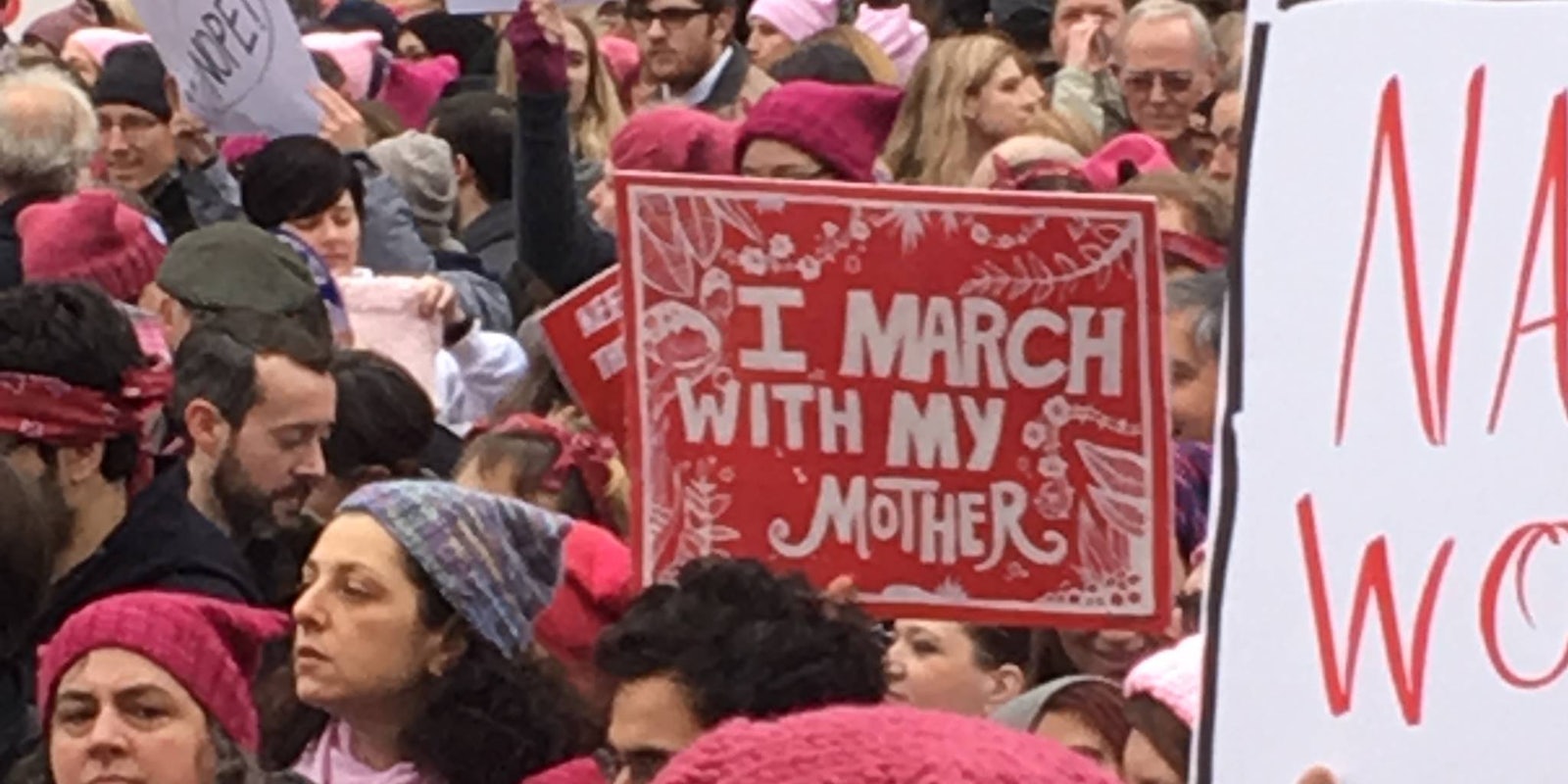I think my mom was the one to suggest attending the Women’s March on Washington. While I was still in shock and unsure how to best resist an administration that threatened to undo so much of what I appreciate about America, she had already coordinated with her cousin in Georgia about where to stay for the weekend.
My mom has been politically active for a long time. In high school, she started an environmental club. In college, she worked for a hotline counseling women on abortion and birth control. A common refrain when we talk about politics is “I can’t believe we’re still talking about this.” Roe v. Wade was decided when she was in college, and she couldn’t imagine that more than 40 years later it’d still be up for dispute.
The Women’s March on Washington was largely organized online and, as such, it would have been easy to think of it as a young person’s game, a day for people with hope in their hearts and fire in their bellies, who haven’t been disappointed by the failures and compromises of a long life under a flawed government. Besides, who else has the energy to stand on their feet and yell for hours at a time?
But going into the march, I knew a bunch of people who were attending with their parents, and whose parents had been fighting for human rights for a long time. And as the day unfolded, a major theme of the march emerged—not just from the frustration experienced by but also from the inspiration that came from the women who have been fighting inequality for generations.
https://twitter.com/KhaledBeydoun/status/822873235066855425
https://twitter.com/therese3l/status/823390652364890112
https://twitter.com/AllisonZaucha/status/823536276863389696
Many women marching joined parents who had spent their lifetimes involved in political activism. “My mom and dad decided on their own that they were going,” said author Miranda Pennington. Her parents live in northern Virginia and have long leaned liberal. “They raised me with progressive values of tolerance and acceptance, overtly anti-racist and vehemently pro-woman views,” she said, recalling going to rallies with them as a kid.
Julia C., of Massachusetts, also went to the march in D.C. with her mother, who has long been involved in “lefty” politics. She told her mom she was planning to go, not wanting to pressure her, but “wasn’t surprised at all that she wants to go. She’s smart and brave and strong.”
Betty Cameron said the same thing about her parents, even though her mom had never attended a protest before. Prior to the march, she told the Daily Dot that she and her family “spend a lot of our phone calls lamenting Trump’s latest appointment or tweet or awful policy stance, so I think we’re all looking forward to getting outside, alongside thousands of other people, and focus on the positive potential of so much mobilized passion.”
It was impossible to turn 360 degrees in the crowd in Washington, D.C. on Saturday and not see a sign decrying just how long people have been yelling about issues like reproductive rights, equal pay, and police brutality. These were the posters my mom smiled at the most, with messages like “Cannot believe my grandma is still protesting this shit!” and “You think I’m mad? You should see my mom.”
https://www.instagram.com/p/BPnAPtYhcob/
But what the mothers of the marches prove was that politics is a lifelong process. It’s not something you do in your 20s and stop caring about. It’s not a single protest or a vote. It’s an everyday commitment to building the world you want to see and resisting the powers that want to keep that world from existing. There is no such thing as winning. There is always another fight.
“My mom explained it to me like this: She’s been doing this sort of stuff her whole life, and while she’s both excited and frustrated for this march, she has seen so much change these past 60 years,” said Rachel Ross. “She feels that activism has played a huge role in all that she’s seen in her lifetime and that she’s marching to make sure that all of those amazing things don’t become undone. She also, of course, recognizes that there is still much to do.”
When I got home my mom called me, giddy over the events of the day and the initial counts for how many millions of people marched around the world. “I’m so happy we were a part of this together, honey,” she said.
It won’t be the last time we fight together. And that’s a good thing.

